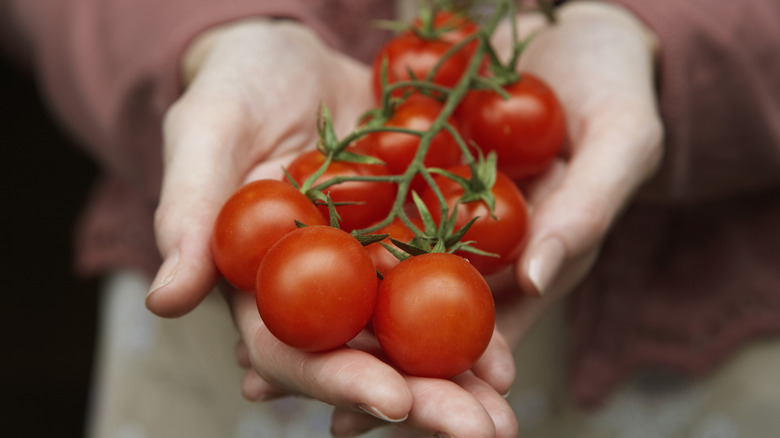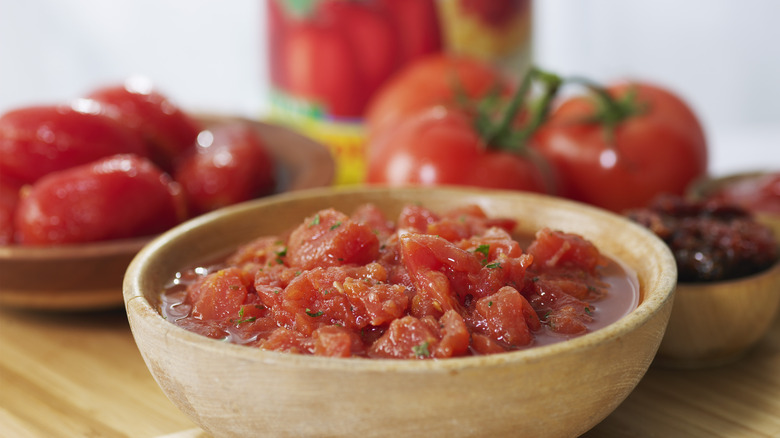Canned Vs. Fresh Tomatoes: Which Are Better For Hydration?
When it comes to hydration, many people think of water and electrolyte-infused sports drinks. But those aren't the only ways to keep our bodies hydrated and functioning properly. In fact, some of the foods we eat naturally harbor substantial amounts of water tucked inside their skins and rinds. These super-hydrators include the obvious watermelon and vegetables such as cucumbers, celery, and lettuce. Then there's the fruit everyone calls a veggie: the brilliantly hued tomato in all its shades of crimson, scarlet, vermillion, rich burgundy reds, and the occasional green or yellow versions.
Tomatoes are comprised of a stunning 95% water, according to Healthline, leaving just 5% imparting that flavorful sweetness we love, along with lots of fiber, vitamins, and, especially, the highly beneficial antioxidant, lycopene. But it's the humble water content that places tomatoes among the highest sources of food-provided hydration. A question arises: Where do canned tomatoes land on the list of hydration heroes?
Many recipes call for canned tomatoes for many reasons. They're easily accessible year-round, and they tend to be less expensive than their fresh counterparts. Cooking is a breeze with canned tomatoes since they've already been cooked and crushed, diced, or pureed. And guess what: They contain about as much water as fresh ones. A chart from the USDA notes that in a 100-gram serving of canned stewed tomatoes, roughly 89 to 95 grams are water, implying that fresh and canned tomatoes hold equal sway in the hydration landscape.
Canned tomatoes have unique hydration and health attributes
In some ways, getting water through fruits and vegetables has an added advantage over swigging down H20 from your trusty water bottle companion. Especially after exercising, when the body needs to replenish lost vitamins and minerals, rehydrating with healthy water-centric foods like tomatoes can return some of those valuable nutrients.
Canned tomatoes facilitate hydration much more easily than fresh ones in some scenarios. Take travel, for instance, especially when it involves an airplane. Dry cabin air and high altitudes when flying can lead to dehydration, which is one reason flight attendants dole out free cans of tomato juice throughout a flight. All the water in those pureed tomatoes, along with sweet, fruity flavor, make it an excellent choice for staying hydrated on a long journey.
Plenty more reasons exist for getting hydration from canned tomatoes in addition to fresh ones. Foremost is the super-valuable lycopene plant compound, which tomatoes are famous for harboring in high amounts. But canned tomatoes have an advantage in that they've already gone through the cooking process, which opens cell walls inside the tomato so that your body can access and absorb lycopene more quickly. You get the water you need while also gaining health benefits from increased lycopene, including prevention or deceleration of chronic diseases, notes Healthline.
Why you need water so much
More than exercising and airplane travel cause dehydration. In fact, all our daily activities lead to water loss, including even the simple acts of breathing, talking, perspiring, or enjoying the warm sunshine on a sunny day. But excess water loss can cause some serious conditions such as heat stroke, kidney stones or failure, seizures, fatigue, confusion, and much more, according to WebMD. Water also helps regulate body temperatures, flush out toxins, lubricate joints, bring oxygen to cells, and various other superhero functions.
That's why "eating your water" through foods like fresh or canned tomatoes becomes an invaluable tool in overall good health. Consuming even a single medium tomato is equivalent to drinking roughly half a cup of water — so pack them in your picnic baskets, camping cooler, and beach bags.
Blend tomatoes into drinks and smoothies, toss them into scrambled eggs, mashed potatoes, avocado dips, curries, salsas, soups, and whatever else your culinary genius imagines. And, of course, pop open a tin or jar of crushed, stewed, peeled, pureed, or chopped tomatoes for sauces, toppings, and pasta.



